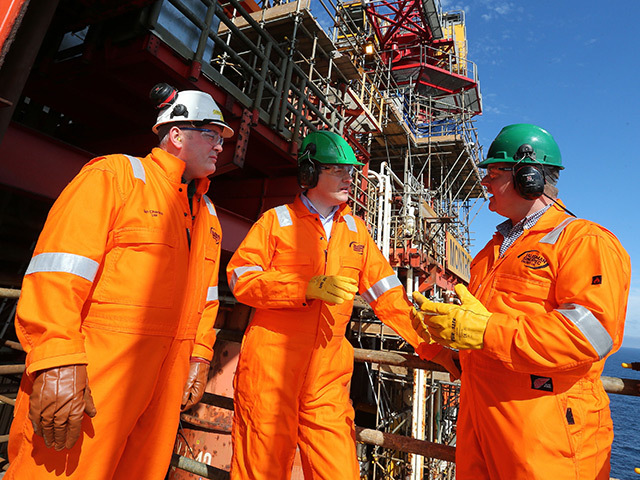
George Osborne has pledged to work with the oil and gas industry to maximise recovery from the North Sea – making clear that he has learned his lesson from the 2011 tax raid on the sector.
And the chancellor said the UK Government would not turn its back on shale gas, despite the controversy surrounding fracking.
Opening the Offshore Europe 2013 conference in Aberdeen yesterday, the politician paid tribute to the men and women who risk their lives every day to keep the UK’s lights on.
Investment in the North Sea – at £13.5billion – is at an all-time high in the UK Continental Shelf.
But production is at its lowest levels since 1977, a consequence of Mr Osborne’s controversial move to lay an extra £2billion tax on oil profits to fund cuts in petrol prices.
The tax shock was met with anger by the industry, and Mr Osborne said yesterday that the breaks announced since have underlined his commitment to getting every last drop out of the basin.
“The UK owes a massive debt to the thousands of men and women who work in what is an inherently dangerous environment – delivering enormous benefits to every family in the country,” he said.
“I know that as an industry you sometimes feel taken for granted. Well, I want you to know this, you are not taken for granted. You are very much appreciated.
Yesterday, he announced a decommissioning deed – a contract between the government and the industry setting out what relief companies can expect when decommissioning assets.
“This is a concrete example of the tax certainty this government is providing,” he said. “No other place in the world provides such a guarantee. Your message, which we’ve heard, is the need for predictability so you can plan for the long-term.
“My ambition is that when you look across the western world, you see the UK as the best and most stable place to invest – and we’re creating the tax and regulatory regime to achieve it.”
READ MORE:
Osborne: Why UK is giving oil industry long term support
Sam Laidlaw, chief executive of Centrica, said that Mr Osborne’s commitment to the oil and gas industry seems genuine.
“I think his commitment to ensure that the North sea is viable and that investment continues is real,” he said.
“I think what we have seen over the past 12 months with the brownfield allowance, the allowances west of Shetland, and today with the decommissioning deeds being drafted, which provides a greater tax certainty than ever before, is welcome.
BG Group chairman Andrew Gould added: “It is a change to have a government which seems to realise how important the oil and gas business is.”
The chancellor also underlined his commitment to shale gas, warning protestors that he is not going to abandon the UK’s vast onshore gas resource.
“Britain led the way in finding new sources of energy – coal in the 18th and 19th centuries, oil in the 20th century, and renewables at the turn of the 21st century.
“If we turn our back on new sources of energy which countries like China and the US are exploiting, then we’re saying to British families: you pay energy bills higher than those paid by families elsewhere.
“We are also saying to British companies: you’ll face costs higher than companies elsewhere, and we’re saying to our country – we’ll have fewer jobs, less investment and higher costs of living. I’m not prepared to say that.”
